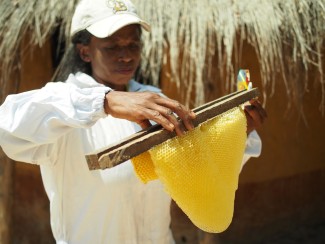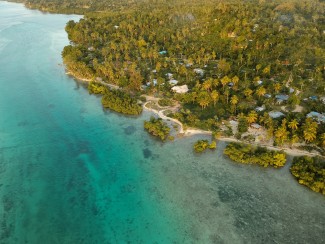The saying one man's trash is another man's treasure has never been more apt for Tuvalu's first export.
In June 2021, two shipping containers of crushed aluminium cans from Tuvalu headed towards South Korea. This marked a first in the country's commitment to the circular economy.
Waste management is a big issue for Tuvalu. With a land size of 25.6km2, it has little space for massive landfills. In fact, it barely has any for the current one located on its main island, Funafuti. As a small, atoll Pacific country, Tuvalu relies heavily on imports to meet the needs of its residents. Imports range from food items, to clothing, electronics to cars. But what happens when these items have been used or break down? The waste generated has nowhere to go.
Reduce, Reuse, Recycle, and Return
This is an issue taken very seriously by the Tuvalu Department of Waste. The first guiding principle of the Tuvalu Integrated Waste Policy and Action plan 2017-2026 is Reduce, Reuse, Recycle, and Return. Tamala Pita, Procurement and Asset Officer at the Department of Waste says: " The concept of circular economy is very important for us considering our size. This is why we have banned single-use plastic bags on the islands and are looking at extending the scope of recyclables beyond aluminium and plastic to batteries and scrap metals."
This was not always the case. Prior to 2019, the Department of Waste did not have any recycling capacities. Recycling of aluminium cans on Funafuti was done by a private individual who was exporting them in small batches. Seeing an opportunity there, the Department of Waste partnered with the Department of Trade. Together with the financial support from the Enhanced Integrated Framework, they purchased a baler machine and constructed a baler shed on the main island . A baler machine presses together waste material like aluminium, which can then be tied together to create a bale. This makes it easier to store and transport waste.
The Department of Waste, in collaboration with local governments, collected all the aluminium cans across the eight islands of Tuvalu. The cans were brought back to Funafuti and crushed. Two shipping containers were filled with these crushed aluminium cans. "This had a significant impact on the quality of life for people in Funafuti and on the outer islands" says Darryl Ikbal Farshid, EIF Project Officer at the Department of Trade. "Especially on the outer islands, waste material has an immediate impact on human health and the environment."
Growth through recyclables
Finding a buyer was the next step. The Department of Trade got in touch with Marine Plastic Solutions, a waste management social enterprise in Australia. The company was able to connect them to a buyer in South Korea. "This partnership with Marine Plastic Solutions was extremely beneficial for us," said Toaiga Semisi, Assistant Trade Officer at the Department of Trade. "They were instrumental in helping us find the best market price for our crushed cans and establishing relationships with buyers."
This was just the first two containers of crushed aluminium cans exported, with more containers earmarked to be leaving Tuvalu later this year. Building on the success of this first waste export, the Tuvalu Department of Trade is now working together with the Department of Waste to identify a potential buyer for scrap metal. The ultimate goal for these Departments is for recyclable exports to contribute to Tuvalu's economic growth and generate at least 0.1 to 0.5% of the Government revenue for 2020-2021. They are right on track, having generated more than AUD 23,000 with this first shipment.
Now that Tuvalu possesses a baler machine, they have the opportunity to crush other waste items like plastic, cardboard and metal. The plan is to focus on reducing and eliminating the adverse impacts of waste materials on human health and the environment to support economic development and improve quality of life. This is just the beginning for Tuvalu's journey toward disposing of its waste in an environmentally friendly manner while building its export capacity.
The concept of circular economy is also central to how the Department of Trade approaches imports and exports. "For me, it's very important", says Temisi. "As a department, it is our responsibility to work closely with productive sectors such as agriculture, fisheries and tourism but also to consider other areas such as environment and health issues. We highly depend on imports like building material, medical equipment, or transportation vehicles. But while we try to promote exports of our local products like red toddy syrup or handicrafts, we also need to consider waste as an important export as well."
Accountability for a zero waste future
Departments of Trade everywhere have the responsibility to ensure that what comes into their countries does not harm the environment or the health of their citizens. But issues like plastic pollution, forever chemicals, and electronic waste, add another dimension to trade.
In Tuvalu, the collaboration between the Departments of Trade and Waste helped raise public awareness of environmental issues, including the benefit of reducing, re-using and recycling material that would otherwise be sent to landfills. The recycling campaign gave a sense of purpose to the community and motivated them to work towards a shared zero waste future. Farshid is confident that with the proper education on reducing, reusing and recycling waste, they can minimize their impact on the environment while also maximising economic impact.
The principles of the circular economy are gaining more prominence, as countries are trying to tackle their own pollution problems as well as the broader issue of climate change. There is a collective realisation that we are all interconnected – that a plastic straw from your local coffeeshop can end up in the nose of a turtle in the South Pacific. Tuvalu's small size is forcing them to face these issues sooner than everyone else, but it also gives them a head start in pioneering the circular economy through trade. Sooner or later, everyone will have to adopt Tuvalu's approach because after all, we are all living on islands too – just bigger ones.
If you would like to reuse any material published here, please let us know by sending an email to EIF Communications: eifcommunications@wto.org.



